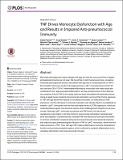| dc.contributor.author | Puchta, Alicja | en_US |
| dc.contributor.author | Naidoo, Avee | en_US |
| dc.contributor.author | Verschoor, Chris P. | en_US |
| dc.contributor.author | Loukov, Dessi | en_US |
| dc.contributor.author | Thevaranjan, Netusha | en_US |
| dc.contributor.author | Mandur, Talveer S. | en_US |
| dc.contributor.author | Nguyen, Phuong-son | en_US |
| dc.contributor.author | Jordana, Manel | en_US |
| dc.contributor.author | Loeb, Mark | en_US |
| dc.contributor.author | Xing, Zhou | en_US |
| dc.contributor.author | Kobzik, Lester | en_US |
| dc.contributor.author | Larché, Maggie J. | en_US |
| dc.contributor.author | Bowdish, Dawn M. E. | en_US |
| dc.date.accessioned | 2016-02-01T15:47:33Z | |
| dc.date.issued | 2016 | en_US |
| dc.identifier.citation | Puchta, A., A. Naidoo, C. P. Verschoor, D. Loukov, N. Thevaranjan, T. S. Mandur, P. Nguyen, et al. 2016. “TNF Drives Monocyte Dysfunction with Age and Results in Impaired Anti-pneumococcal Immunity.” PLoS Pathogens 12 (1): e1005368. doi:10.1371/journal.ppat.1005368. http://dx.doi.org/10.1371/journal.ppat.1005368. | en |
| dc.identifier.issn | 1553-7366 | en |
| dc.identifier.uri | http://nrs.harvard.edu/urn-3:HUL.InstRepos:24984047 | |
| dc.description.abstract | Monocyte phenotype and output changes with age, but why this occurs and how it impacts anti-bacterial immunity are not clear. We found that, in both humans and mice, circulating monocyte phenotype and function was altered with age due to increasing levels of TNF in the circulation that occur as part of the aging process. Ly6C+ monocytes from old (18–22 mo) mice and CD14+CD16+ intermediate/inflammatory monocytes from older adults also contributed to this “age-associated inflammation” as they produced more of the inflammatory cytokines IL6 and TNF in the steady state and when stimulated with bacterial products. Using an aged mouse model of pneumococcal colonization we found that chronic exposure to TNF with age altered the maturity of circulating monocytes, as measured by F4/80 expression, and this decrease in monocyte maturation was directly linked to susceptibility to infection. Ly6C+ monocytes from old mice had higher levels of CCR2 expression, which promoted premature egress from the bone marrow when challenged with Streptococcus pneumoniae. Although Ly6C+ monocyte recruitment and TNF levels in the blood and nasopharnyx were higher in old mice during S. pneumoniae colonization, bacterial clearance was impaired. Counterintuitively, elevated TNF and excessive monocyte recruitment in old mice contributed to impaired anti-pneumococcal immunity since bacterial clearance was improved upon pharmacological reduction of TNF or Ly6C+ monocytes, which were the major producers of TNF. Thus, with age TNF impairs inflammatory monocyte development, function and promotes premature egress, which contribute to systemic inflammation and is ultimately detrimental to anti-pneumococcal immunity. | en |
| dc.language.iso | en_US | en |
| dc.publisher | Public Library of Science | en |
| dc.relation.isversionof | doi:10.1371/journal.ppat.1005368 | en |
| dc.relation.hasversion | http://www.ncbi.nlm.nih.gov/pmc/articles/PMC4713203/pdf/ | en |
| dash.license | LAA | en_US |
| dc.title | TNF Drives Monocyte Dysfunction with Age and Results in Impaired Anti-pneumococcal Immunity | en |
| dc.type | Journal Article | en_US |
| dc.description.version | Version of Record | en |
| dc.relation.journal | PLoS Pathogens | en |
| dash.depositing.author | Kobzik, Lester | en_US |
| dc.date.available | 2016-02-01T15:47:33Z | |
| dc.identifier.doi | 10.1371/journal.ppat.1005368 | * |
| dash.authorsordered | false | |
| dash.contributor.affiliated | Kobzik, Lester | |


